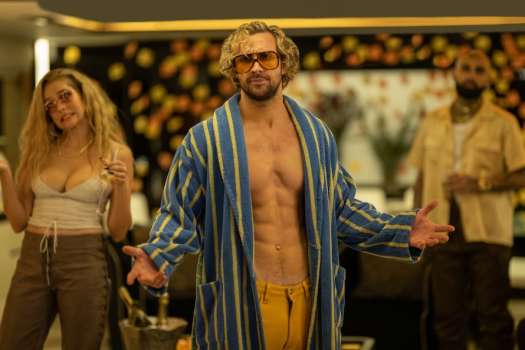We're at the point where no one bats an eyelid when Hollywood reboots or remakes a classic movie or TV show. There may be some groans from the depths of film Twitter, but generally speaking, it's not headline news anymore. Instead, our attentions are turned to how good a revival can be, and how the filmmakers will update a beloved IP to suit modern audiences. The next batter up in the reboot lineup is the new Prime Video series A League of Their Own, a continuation of Penny Marshall's classic 1992 film.
For the time, Marshall's film was fairly progressive, but by 2022's standards, there are many gaps to fill in, which creators Will Graham and Abbi Jacobson are eager to do. Namely, they give space for what life was like in the 1940s for Black and queer people. The series is split into two worlds to accommodate these stories during the eight-episode run.
In one world, we rejoin the Rockford Peaches. While none of the original characters are present, they are reborn in many of the new players. Co-creator Jacobson plays Carson, the protagonist of this world and the Peaches' catcher. She's headstrong and full of baseball knowledge with a husband (Patrick J. Adams) at war; D'Arcy Carden is the va-va-voom, refined pin-up Greta; Melanie Field plays Jo, Greta's spunky, wisecracking best friend; Molly Ephraim gives us Maybelle, the boisterous peppy blonde; Shirley (Kate Berlant) is the religious moral compass of the team; Canada's own Kelly McCormack plays the lone Canadian, Jess, who comes from Moose Jaw.
Much like the original team, the Peaches are cast very well and their chemistry as a ball club is excellent. Berlant and Ephraim in particular shine in supporting roles that provide a lot of the show's humour. After always stealing the show as the hilarious best friend, Carden is finally given a shot at a leading role and she smashes a home run. As Greta she's sexy, fun, genteel, strong and vulnerable, carrying on Madonna's "All the Way" Mae legacy formidably.
Much of the Peaches' storyline follows their journey to a championship, but also heavily leans into the personal lives of the team, with many of the players being queer. Given the time period, A League of Their Own addresses the dangers of being queer in public, something the film never properly acknowledged. Greta and Jo mention the rules that they've created to ensure their safety, where Shirley gives voice to the discriminatory opinions of the day. Graham and Jacobson tackle the subject thoughtfully and holistically, lending a texture to the story that didn't exist in the original film.
In the series, the Peaches include Lupe (Roberta Colindrez) a Mexican-American, and young Esti (Priscilla Delgado) from Cuba. Discrimination on account of their heritage isn't raised, although Esti's lack of English is a talking point. Presumably, their fair complexions are what allows them to play in the All-American Girls Professional Baseball League, whereas Max (Chanté Adams), a Black pitcher with a killer fastball, is told that people of colour won't be allowed to try out.
One of the most iconic scenes in the movie was at the tryouts, when an errant ball was effortlessly caught by a middle-aged Black woman whose presence was never explained. This time around, the Black community and Jim Crow segregation are explored, with Max's storyline being the second world of the show.
After being turned away from tryouts, Max and her best friend, Clance (Gbemisola Ikumelo), return home, and we follow along in their daily exploits as two Black women trying to find their way in a world against them. Topics like the importance of the Black community owning their own businesses, and the danger their men face when being drafted into war for a country that doesn't care if they live or die, are explored. And with Max, we follow her on a journey of self-discovery of who she is beyond baseball and how she identifies.
Ikumelo steals the series constantly as the hilarious best friend with a heart of gold who we all wished we had, and Adams is a strong force leading her section of the show. Their chemistry is really fun and heartfelt, brining a nuance to female friendships not always seen on screen. Additionally, Lea Robinson is fantastic as Bertie, Max's relative who was banished from the family for reasons initially unknown to Max. Bertie is a weighty role, which Robinson plays with great reverence.
There's a lot going on in the series — so much so that it isn't unreasonable to think that each world could have been its own series. Although no character is necessarily robbed of airtime, I would have loved to spend more time with Clance, Shirley and Esti. Shirley, in particular, is an interesting character; her surname is Cohen, and while her Jewish heritage is mentioned in passing, nothing is made of the prevalent antisemitism of the time. Hopefully, if another season is made, Shirley's story will expand as World War II progresses.
While the social aspects of the show are its heart, the baseball is still paramount. The games and choreography behind plays are designed well and the cast members execute them skilfully. One particular aspect of the game I really appreciated was the importance given to the Negro Leagues and some key players like Josh Gibson and Bullet Rogan.
It's commendable that the series takes the time to expand on worlds beyond the straight white women of the film. While the 1992 film shone a light on a league that many weren't aware of or didn't care about, the series gives a fuller look at what life was like at the time. The narrative arc across both stories is engaging, albeit a bit predictable. But the biggest criticism to levy against the show is the realism with which these worlds are built. The costuming, hair and production design are done well, but there is a level of artificiality behind the construction. The show feels too contemporary in its delivery, and while the themes and messaging aren't hurt by this, but it's hard to absorb into the world completely.
As far as reboots go, Graham and Jacobson retain what made the movie a classic while expanding on the story in a natural way. There are callbacks and references to Marshall's film, but they are done sparingly and organically. Many interesting stories exist under the A League of Their Own banner, and where Marshall said "play ball," Graham and Jacobson take the story into extra innings. Here's hoping they get another season to keep the game going.
(Prime Video)For the time, Marshall's film was fairly progressive, but by 2022's standards, there are many gaps to fill in, which creators Will Graham and Abbi Jacobson are eager to do. Namely, they give space for what life was like in the 1940s for Black and queer people. The series is split into two worlds to accommodate these stories during the eight-episode run.
In one world, we rejoin the Rockford Peaches. While none of the original characters are present, they are reborn in many of the new players. Co-creator Jacobson plays Carson, the protagonist of this world and the Peaches' catcher. She's headstrong and full of baseball knowledge with a husband (Patrick J. Adams) at war; D'Arcy Carden is the va-va-voom, refined pin-up Greta; Melanie Field plays Jo, Greta's spunky, wisecracking best friend; Molly Ephraim gives us Maybelle, the boisterous peppy blonde; Shirley (Kate Berlant) is the religious moral compass of the team; Canada's own Kelly McCormack plays the lone Canadian, Jess, who comes from Moose Jaw.
Much like the original team, the Peaches are cast very well and their chemistry as a ball club is excellent. Berlant and Ephraim in particular shine in supporting roles that provide a lot of the show's humour. After always stealing the show as the hilarious best friend, Carden is finally given a shot at a leading role and she smashes a home run. As Greta she's sexy, fun, genteel, strong and vulnerable, carrying on Madonna's "All the Way" Mae legacy formidably.
Much of the Peaches' storyline follows their journey to a championship, but also heavily leans into the personal lives of the team, with many of the players being queer. Given the time period, A League of Their Own addresses the dangers of being queer in public, something the film never properly acknowledged. Greta and Jo mention the rules that they've created to ensure their safety, where Shirley gives voice to the discriminatory opinions of the day. Graham and Jacobson tackle the subject thoughtfully and holistically, lending a texture to the story that didn't exist in the original film.
In the series, the Peaches include Lupe (Roberta Colindrez) a Mexican-American, and young Esti (Priscilla Delgado) from Cuba. Discrimination on account of their heritage isn't raised, although Esti's lack of English is a talking point. Presumably, their fair complexions are what allows them to play in the All-American Girls Professional Baseball League, whereas Max (Chanté Adams), a Black pitcher with a killer fastball, is told that people of colour won't be allowed to try out.
One of the most iconic scenes in the movie was at the tryouts, when an errant ball was effortlessly caught by a middle-aged Black woman whose presence was never explained. This time around, the Black community and Jim Crow segregation are explored, with Max's storyline being the second world of the show.
After being turned away from tryouts, Max and her best friend, Clance (Gbemisola Ikumelo), return home, and we follow along in their daily exploits as two Black women trying to find their way in a world against them. Topics like the importance of the Black community owning their own businesses, and the danger their men face when being drafted into war for a country that doesn't care if they live or die, are explored. And with Max, we follow her on a journey of self-discovery of who she is beyond baseball and how she identifies.
Ikumelo steals the series constantly as the hilarious best friend with a heart of gold who we all wished we had, and Adams is a strong force leading her section of the show. Their chemistry is really fun and heartfelt, brining a nuance to female friendships not always seen on screen. Additionally, Lea Robinson is fantastic as Bertie, Max's relative who was banished from the family for reasons initially unknown to Max. Bertie is a weighty role, which Robinson plays with great reverence.
There's a lot going on in the series — so much so that it isn't unreasonable to think that each world could have been its own series. Although no character is necessarily robbed of airtime, I would have loved to spend more time with Clance, Shirley and Esti. Shirley, in particular, is an interesting character; her surname is Cohen, and while her Jewish heritage is mentioned in passing, nothing is made of the prevalent antisemitism of the time. Hopefully, if another season is made, Shirley's story will expand as World War II progresses.
While the social aspects of the show are its heart, the baseball is still paramount. The games and choreography behind plays are designed well and the cast members execute them skilfully. One particular aspect of the game I really appreciated was the importance given to the Negro Leagues and some key players like Josh Gibson and Bullet Rogan.
It's commendable that the series takes the time to expand on worlds beyond the straight white women of the film. While the 1992 film shone a light on a league that many weren't aware of or didn't care about, the series gives a fuller look at what life was like at the time. The narrative arc across both stories is engaging, albeit a bit predictable. But the biggest criticism to levy against the show is the realism with which these worlds are built. The costuming, hair and production design are done well, but there is a level of artificiality behind the construction. The show feels too contemporary in its delivery, and while the themes and messaging aren't hurt by this, but it's hard to absorb into the world completely.
As far as reboots go, Graham and Jacobson retain what made the movie a classic while expanding on the story in a natural way. There are callbacks and references to Marshall's film, but they are done sparingly and organically. Many interesting stories exist under the A League of Their Own banner, and where Marshall said "play ball," Graham and Jacobson take the story into extra innings. Here's hoping they get another season to keep the game going.




